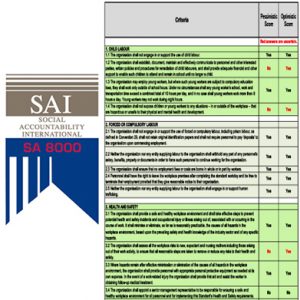measuring sustainability
Exercise
SA8000 labor certification
 Time Estimate: 2—4 hours
Time Estimate: 2—4 hours
 Goal: Use SA8000 certification criteria to consider your social sustainability priorities for labor.
Goal: Use SA8000 certification criteria to consider your social sustainability priorities for labor.

Rate your organization and/or supply chain according to a simplified SA8000 certification list, estimating data as needed, and accounting for uncertainty in your estimates.
Step 1: Read the certification criteria
 Time Estimate: 20—40 minutes
Time Estimate: 20—40 minutes
- Read the Full SA8000 2014 list of criteria
- When you need clarification of a point, consult the Guidance document for SA8000 2014
Step 2: Use a spreadsheet to score your organization according to SA8000 (abridged).
 Time Estimate: 2—4 hours
Time Estimate: 2—4 hours
Perform an estimated self-assessment of your organization. For the sake of time, you need not check every item in the standard; you can perform your assessment based on the 36 criteria in categories 1 – 8. You can use this template spreadsheet–it lists all those criteria, but does not list the 26 criteria in category 9, “management systems”. If you are motivated to do a more thorough self-assessment, you can find all criteria listed in the full SA8000 2014 list of criteria PDF and guidance document linked to above. Your spreadsheet should:
- Be based on as much real data as possible. The easiest way to score is to consider only your company / organization itself; the most thorough way to score is to include all suppliers in your value chain. However, the latter is much more difficult and will take far more time than suggested here.
- Visually flag your uncertainties. There will be data unavailable to you, or not yet decided. Show these in red text or some kind of highlight to mark uncertainties, and when you mark the score, give an upper & lower bound to account for these unknowns. (That is, by filling in a “no” for the pessimistic score and “yes” for the optimistic score)
- Show the final result–could your organization achieve SA8000 certification? This requires meeting all criteria. Show both the best-case and worst-case result.
- List brief notes for each line item (just a few words, usually; definitely not a paragraph), why you scored it the way you did.
- Be graphically designed to be clear and educative, because it will be a communication tool between you and your team, or your investors, or your future self. It can be a dashboard for improvement.
Step 3: Interpret your results.
 Time Estimate: 5—10 minutes
Time Estimate: 5—10 minutes
- Would you qualify for SA8000 certification in your best-case scenario? What about worst-case scenario?
- What criteria would prevent you from qualifying? In what categories are you scoring well?
- What would be easy for you to change?
Use these conclusions to set your priorities for socially sustainable operations and company policy.
Checklist for Self-Assessment
To score your success on this exercise, see if you…
- Listed yes/no scores for all points of the certification.
- Visually flagged uncertainties and showed optimistic and pessimistic scores in different columns.
- Listed final result of whether or not you could achieve certification, for best case and worst case.
- Listed brief notes for each line item.
- Made the document visually clear and easy to interpret by someone other than you.
- Described how your score(s) affect your design priorities: what prevents you from certifying, where are you scoring well, what would be easy to change, etc.
All VentureWell Tools for Design and Sustainability content is shareable and usable by CC BY-NC-SA 4.0 license.